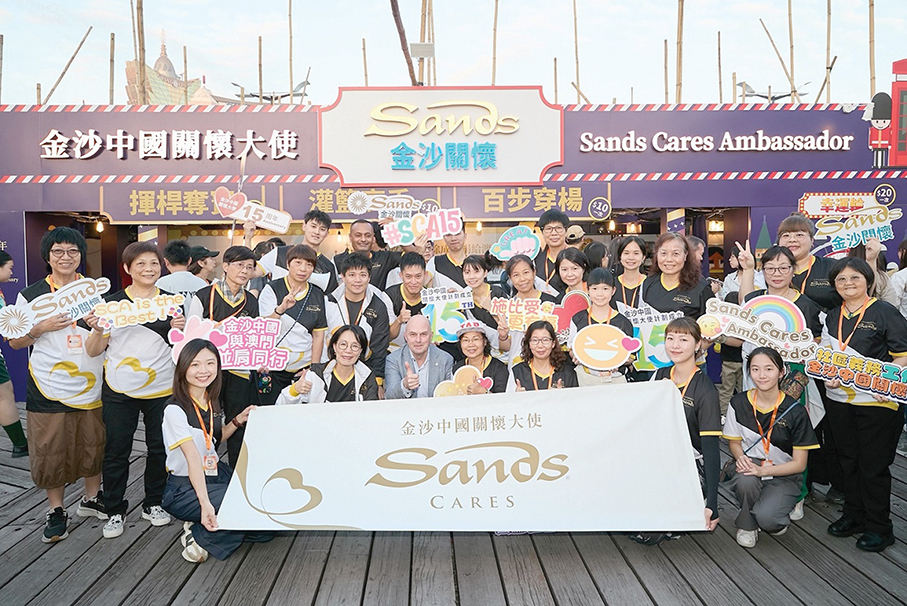Macau continues to assist Guizhou’s Congjiang county in getting rid of poverty. It is a solemn commitment the Macau Special Administrative Region (MSAR) has undertaken and that it is taking very seriously. The assistance is a patriotic duty for the MSAR.
Congjiang is a county in the Qiandongnan Miao and Dong Autonomous Prefecture of Guizhou. Congjiang covers an area of 3,244 square kilometres (about triple the size of the Hong Kong Special Administrative Region) and has a population of about 300,000, or slightly less than half the MSAR’s. A major segment Congjiang’s population is made up by members of the Miao and Dong ethnic minorities.
A recent work report by the Guizhou Provincial Poverty Alleviation and Development Office has recommended that the province, in its capacity as the first batch of the nation’s inland open economic pilot zones, has the potential to become an important land-sea connection for the central government’s Belt and Road Initiative (BRI), and set up close communication and cooperation channels between mainland China and Portuguese-speaking countries through Macau.
Guizhou is a landlocked province in the nation’s south-west. It covers an area of 176,167 square kilometres (nearly the size of Cambodia) and has a population of about 35 million (about the same as Saudi Arabia).
Guizhou is an important platform to further deepen cooperation, including the construction of the Greater Bay Area (GBA) and the Pan-Pearl River Delta (PPRD) Regional Economic and Trade Conference, as well as the setting-up of new international land-sea trade channels. The central authorities’ ultimate aim is to deeply integrate Guizhou into the nation’s development strategy.
In November, Central People’s Government Liaison Office in the MSAR Vice Director Yan Zhichan led a delegation to Congjiang. The high-powered delegation included Macau Foundation (FM) Chairman Wu Zhiliang, Macau Government Information Bureau (GCS) Deputy Director Wong Lok I and 14 senior media representatives from Macau. The delegation members were keen to know more about Macau’s poverty alleviation programme in Congjiang over the past three years. The purpose of the visit was to inspect the country’s poverty alleviation situation and the progress that has been made in its poverty relief measures.
According to the Guizhou Provincial Poverty Alleviation and Development Office, the MSAR has signed 27 agreements with Congjiang since May 2018, involving a total of 73 projects, comprising 41 in the area of engineering projects and 32 financial and other undertakings.
As of the end of October, the funds spent on the 27 agreements amounted to 98.984 million yuan, of which 79,565,500 yuan in financial and material assistance have already been used to get specific projects off the ground.
In addition, all sectors of Macau’s civil society have made 75 donations involving 16.494 million yuan in financial and material support. Overall, the funds and materials that the MSAR authorities and civil society has granted Congjiang had reached 115,479,100 yuan at the end of October.
According to official reports, the 27 poverty alleviation agreements cover areas such as education, medical care, tourism, human resources, manufacturing, and the promotion of talents. The projects are carried out under the working mechanism of “the MSAR government’s leadership, the participation of all sectors of society, and the guidance and cooperation of the Liaison Office”.
Among them, in the past two years, a total of 13 primary schools and kindergartens plus 24 village-level clinics have been built, and an ambulance has been donated to each of seven towns and villages, which has solved previous problems and helped about 30,000 residents seek medical treatment near their homes.
A total of 685 rural households have tackled the ventilation and leakage issues of old houses’ and the problem of people and animals living under one roof. In addition to projects involving hardware, the MSAR has also sent experts to Congjiang to assist in the training of 300 preschool teachers and 100 middle school English-language teachers, and arranged for 29 English-language teachers from six local primary schools as well as 40 kindergarten teachers to further their studies in Macau.
Also for three consecutive years, 3,000 students facing financial difficulties have been assisted in advancing to higher education. Each student received a 500 yuan scholarship, which was transferred by the education authorities to each student’s family bank account.
The MSAR has also assisted Congjiang in building construction. One of the assistant programme’s entrepreneurial support funds invested 1.086 million yuan in building eight rubbish incinerators and purchasing 383 rubbish bins for 23 villages in 10 townships, as well as 104 trolleys and 14 garbage trucks, among other things. The programmes have also included the organisation of tour groups to Congjiang and measures to assist the county’s enterprises in purchasing agricultural products and building Yao medicine processing plants in the local area. “Yao” is Chinese herbal medicine (CHM), a pharmaceutical part of traditional Chinese medicine (TCM).
The report noted that Guizhou and Macau have established a deep friendship and a good communication mechanism through its close poverty alleviation cooperation. No doubt, it can be further deepened and continued in the future
This kind of cooperation will seize more development opportunities for both sides. While helping promote the revitalisation of the countryside, it can also promote Macau through its involvement in a string of mutually beneficial projects.
All walks of life, especially the younger generation, are known to be keen to further advance Macau-Congjiang cooperation in the county’s production base development, quality standard research, marketing and circulation economics.
In summing up her visit, Liaison Office Vice Director Yan underlined that through this important visit she has been able to deepen her knowledge and understanding of Macau’s rich experience in helping Congjiang tackle poverty and pass this great experience on to civil society in the MSAR.
The aim is to pass on more positive energy. On the other hand, Macau Foundation President Wu Zhiliang noted that Macau has been already successfully participating in Congjiang’s poverty alleviation process for a number of years, which has enhanced the mutual feeling of belonging to the same family and country.
All the delegation members agreed that both Macau and Congjiang are benefitting from their close ties of patriotic cooperation and the growing strength of their fraternal relationship as parts of the Motherland.
No doubt, Macau can take great pride in being able to assist Congjiang, which lies some 615 kilometres north-west of Macau, in leaving poverty behind for good. That’s what Macau people’s traditional patriotism is all about.
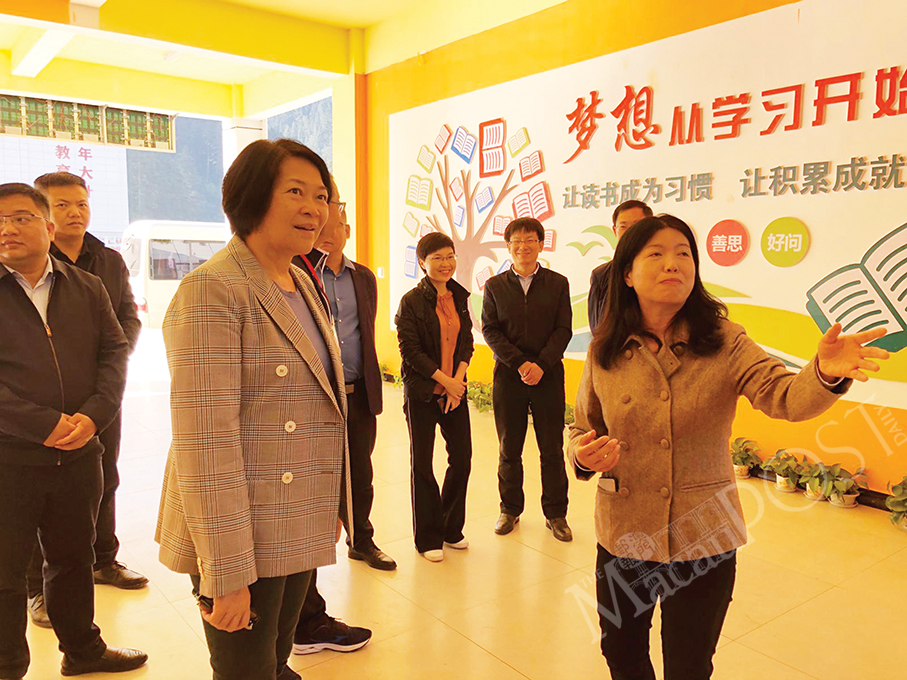
Central People’s Government Liaison Office in the MSAR Vice Director Yan Zhichan (left) visits Congjiang’s Dadai Primary School, which was built by Macau as part of its effort to help Congjiang tackle poverty, last month.
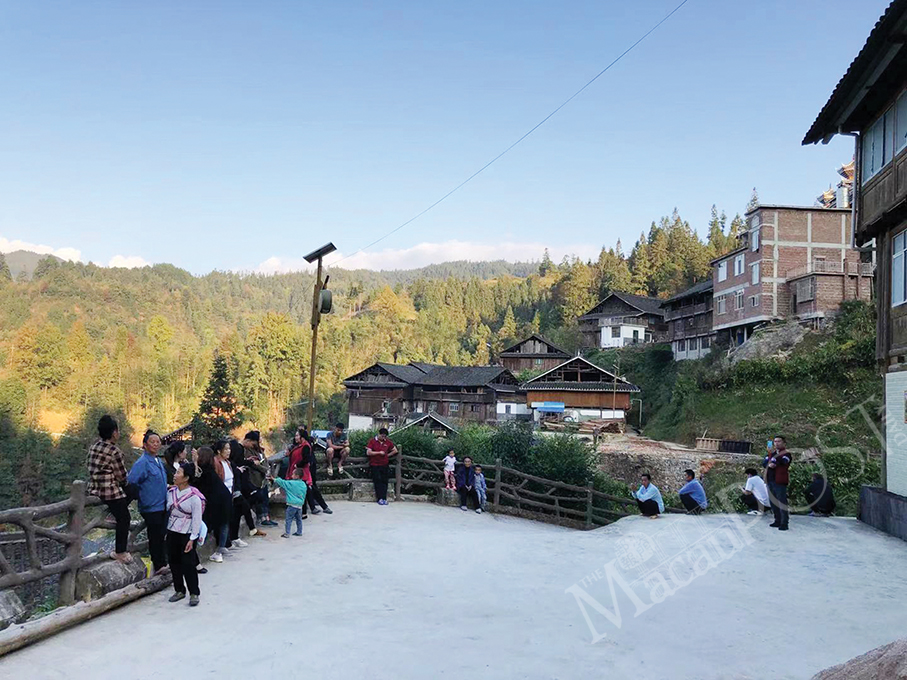
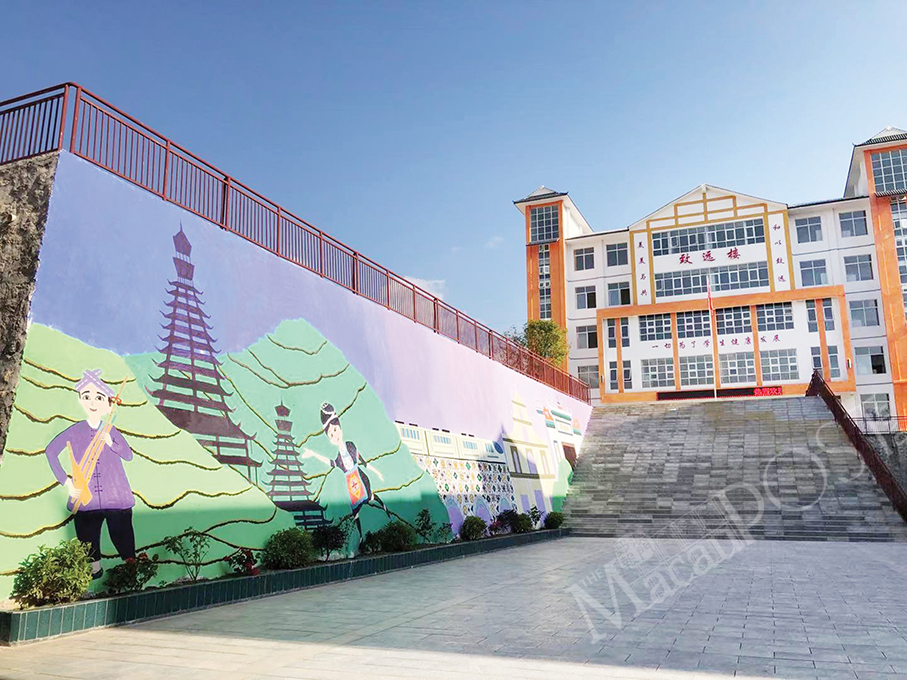
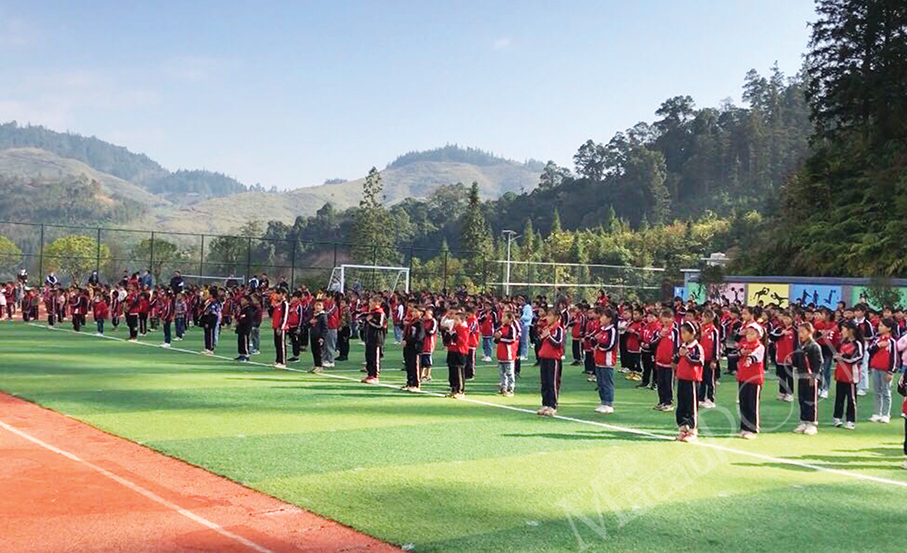
Photos: MPDG








